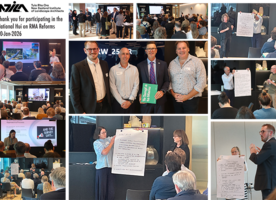News
Putting people at the centre of neighbourhoods
Posted 10 02 2021
in News

Landscape Architecture Aotearoa
Dr Natalie Allen is an urban strategist and director at The Urban Advisory. Working with central and local government, developer and community clients she specialises in the design and delivery of urban regeneration and renewal programmes, integrated mixed-use neighbourhoods, and community-led development projects.
Dr Allen is one of the speakers at the NZILA Firth Conference in Tauranga in May. Her presentation is looking at neighbourhoods as cohesive landscapes that deliver wellbeing.
LAA: How has COVID-19 influenced your thinking on neighbourhood design and the importance of community?
NA: COVID has made us very cognizant of just how plausible wide-reaching and fast-acting change can be, which is an exciting prospect for how we might be able to live in the future. With the increasing work-from-home opportunities it has also shed a very important light on the benefits of having amenities integrated into our neighbourhoods. This includes supermarkets (and other food stores), cafes, print shops and postal services, and other facilities that benefit the increasing number of people who want to be able to access work-related amenities from their home environments.
LAA: How have community needs changed over the last 20 years, or are the same things important in design?
NA: I think there has been a steady shift towards the importance of convenience as people try to fit more and more into their daily lives. Of course the core principles around how valuable green and open spaces are, places to convene and access to nature are still constants. But there are not the same work versus home divides as before. With the increasing rates of loneliness also, I think we need to focus a lot more on how to design in opportunities for interactions and more multi-generational spaces than we have previously considered.
LAA: To create an effective, desirable neighbourhood, how important is collaboration between professions?
NA: Collaboration between the professions is fundamental to success given the increasingly complex nature of today's projects and the multi-use functionality required as a reality of cost and space saving. This includes not only the design professions, but all players involved in delivery through better public private partnerships.
LAA: What makes an effective urban designer/strategist?
NA: An effective urban designer/strategist must be a connecter of people and ideas who can bring together disparate views and generate inclusive, forward-thinking solutions. They must also have a deep respect for places and their layered histories and help to bring others on the delivery journey with them.
LAA: What will your key message at the NZILA conference be?
NA: Neighbourhoods are cohesive landscapes that require integrated thinking — across the whole built environment industry — about how to deliver convenience and build community. The design of our future neighbourhoods needs to centre around embracing a citizen-centric approach and an understanding of the evolving ways in which urban amenities are valued by residents.
12 Feb
NZILA lodges submission on Planning Bill and Natural Environment Bill

There’s still time to have your say
Tuia Pito Ora New Zealand Institute of Landscape Architects has lodged its formal submission on the Planning Bill and Natural …
09 Feb
Weekly international landscape, climate and urban design update

Monday 9 February
This is your weekly international snapshot of what’s happening across landscape architecture, climate adaptation and urban design. Drawing on credible …
02 Feb
RMA Reform submission update

Call for feedback and images
Submission framework The Environmental Legislation Working Group thanks all members who made the effort to join us at the national …
Events calendar
Full 2026 calendar